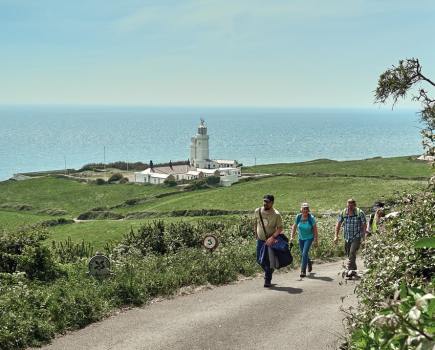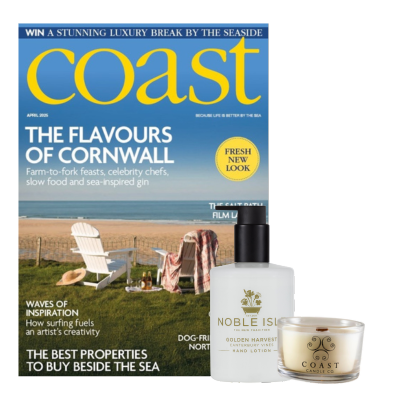Cornwall is a green and pleasant land in so many ways. CHRISSY HARRIS joins Behaviour Change Cornwall – a young couple on a mission to clean up our seas and make something pretty in the process.
It had been a dark and stormy the night before we rocked up to Tregantle Beach in Whitsand Bay, south east Cornwall.
“I think we’ll find quite a lot of plastic today,” says Sam Gill, a lifelong beach cleaner. “Oh good, you’ve brought gloves. Right, are you ready?”
This stretch of coastline is a beautifully unspoilt part of the county and popular with surfers, dog walkers and day-trippers over from Plymouth.
It’s proper Cornish-looking, all rugged and rolling waves with miles of golden sand. It’s also prime foraging territory for Sam and his partner Melissa Carne.
The couple, both 27, run Behaviour Change Cornwall, a business Sam set up in 2017 to recover washed-up plastic from his local coastline and turn it into something so much better.
‘Ghost nets’ (bits of abandoned fishing net) and any other ocean plastics are collected from Cornish beaches by Sam and teams of helpers before being taken back to base in Looe. Here, the various items are intensively cleaned and then recycled into beads, bracelets, coasters and keyrings.
Behaviour Change Cornwall’s range is growing all the time and Sam and Melissa’s creations have attracted a global customer following. But it all starts right here, on the beach at low tide.
We don’t have to venture far to start today’s collection. Brightly coloured nets, containers and tiny pieces of plastic (nurdles) are waiting for us at the foot of the steps down to the beach. There is also – grimly – a dead dolphin.
“We do see them occasionally,” says Sam, adding that spotting things like this only spurs him on. He spent years researching ways of changing environmentally damaging behaviours as part of his university degree in sustainable futures. But he soon realised that while researching the problem is useful, doing something about it is far more helpful.
“I thought – I know there’s an issue but there must be something practical I can do about it,” says Sam. “So I started making things out of what we found on our beach cleans and showed them to friends and family and…”
He suddenly disappears across the beach.
“He does this,” says Melissa. “He’s seen that blue container over there.”
Sam has legged it over towards the rocks to recover a big bashed-up plastic box used by fishermen to store their haul. This is a top find because melting it down will provide lots of recycled material to make beads for necklaces and bracelets.
Sam has developed a keen eye for spotting the big-ticket items, as well as smaller finds of unusual colours. He’s always on the lookout for rare combinations.
“He gets excited if it’s a weird colour,” says Melissa, a graphic designer who joined Sam’s venture as demand for Behaviour Change Cornwall’s products grew. She takes up the story while Sam is off filling the blue box with other plastic ‘treasures’.
“We started off the website and had a few orders come through,” she says. “Now, it’s gone crazy. We’re just about keeping up. The wholesale side of it has been going really well and we’ve just got this amazing number of people supporting us in Cornwall and across the world in places like New Zealand and Japan.”

21 of the best beaches to visit this summer
The couple have been gradually building up their enterprise, thanks to help from grants and investments, plus collaborations with other local businesses. Behaviour Change Cornwall has several small workshops dotted in and around Looe where the found plastic is taken to be cleaned, tested and processed. All the sand, seaweed and any harmful pollutants, such as oil are carefully removed. It’s already a pretty effective operation, considering Sam and Melissa do most of the work themselves (they draft in extra pairs of hands when necessary). The big plan is to set up the UK’s first ocean plastic recycling facility down here and they are currently in the process of buying a premises.
“The money we make goes back into allowing us to do more of this,” says Melissa, bending down to pick up another piece of net (yellow – top find). Sam is busy snipping seaweed off another clump of twisted streaks of blue and orange.
“This is what they call dolly rope,” he explains. “It’s thousands of orange or blue plastic threads that are used to protect bottom trawling nets against wear and tear – it’s basically the sacrificial bit of net. Bundles of it end up in the sea.”
Ah, so that’s what they are. I see them all the time on my local beach over the border in Devon.
Sam goes on to talk about other types of net (he now knows a lot about nets) and how different fishermen in different parts of the world use different colours. I am listening but I’ve just seen something on the pebbles.
“Oooh look, a turquoise bit!”
“Nice! That’s an unusual colour. See – you’re getting caught up in the excitement of it now,” says Sam.
He’s right. This is both depressing and uplifting in equal measure. Yes, there’s a lot of plastic here today, thanks to a perfect storm of waves and tides. But that just means more material to make into nice things.
“The way I look at it, we’re getting this discarded plastic off the beach that no one wants and putting it back into the economy,” says Sam. “We’re making it useable again.”
As we round up today’s finds by the steps, Sam says many of the local fishermen he talks to about his business are supportive of what he’s doing.
He’s also keen to do more projects to encourage people of all ages to do their small bit for a big crisis.
“Lots of us want to do the right thing and attitudes are changing,” says Sam. “There are so many promising signs. Do you want to grab that piece of kayak? I can take this and then Melissa, are you okay to drag that?”
We set off up the hill (it’s really steep, btw) each of us carrying an eclectic array of foraged finds which will go into Sam’s van and taken back to Behaviour Change HQ to be cleaned tonight. The sooner the better, apparently.

“Thanks for your help today,” says Sam when we finally reach the top. “I hope it’s given you some insight into our slightly strange existence!” he adds, laughing.
There’s nothing strange about wanting to make a difference. They’re good at that in Cornwall. Sam and I talk about just how many little enterprises there are down here, all working towards a greener future.
“There’s this fantastic environment of innovation down here,” he says, before going back down the hill to help Melissa, who has definitely been landed with the most awkward haul.
“Lots of people don’t realise what’s achievable.”
See behaviourchangecornwall.co.uk
MAKING A DIFFERENCE IN CORNWALL
With such an inspiring landscape, it’s no wonder that people across this special part of the world are doing their bit to protect their environment.
Whether you live here or are just visiting, there are lots of ways you can help, too:
- Plastic-free shopping – shop in one of the many zero-waste and refill shops across the county, including un_rap, Falmouth, The Refill Store, Truro, and the Refill Shop, Bude.
- Surf kind – ditch the polystyrene surf boards and hire a wooden one. Surf Wood for Good offers free bellyboards rental as a positive alternative to polystyrene bodyboards. Find them at locations across Cornwall, including Karma Surf Shop, Newquay and Little Goat Gruff, St Ives.
- Get on your bike – explore the region on two wheels, rather than four. The Camel Trail is an 18-mile, largely traffic-free, surfaced and reasonably level multi-use trail created from two disused railway lines in north Cornwall. Or else try the Clay Trails, St Austell.
- Enjoy local produce – rather than a pre-holiday giant supermarket shop, buy your food down here from one of the many local markets. Tregew Food Barn, near Falmouth, hosts more than 20 stalls every Saturday morning, offering sustainable produce. The long-established Helston Farmers’ Market is on the first Saturday of each month. St Ives Farmers’ Market is a community venture to help make fresh local produce available in the town. It runs every Thursday throughout the year at The Guildhall, Street an Pol.
- Visit off-season – help to spread the footfall by visiting Cornwall now – not in the summer. You’ll (probably) enjoy a few sunny days and be first in the queue at the pasty shop. Bonus.
ECO-FRIENDLY CORNISH STAYS
Bedruthan Hotel’s ‘Cherish Our World’ ethos aims to minimise the impact they have on the environment. They do this through careful waste management, biodiversity, water conservation and energy saving. Their waste management scheme includes composting garden waste, tea leaves and coffee grounds from the restaurant.
Greenbank Hotel, Falmouth has a Gold Level Green Tourism award, for a dedicated approach to sustainability. There are financial incentives for guests who choose to arrive by public transport. In addition, guests can use the ‘two minute beach clean’ station installed in Greenbank Gardens.

Little Gwendreath Holiday Cottages, The Lizard. Nature is at the heart of this this collection of two-bedroom cottages, based on Cornwall’s beautiful Lizard Peninsula. The owners here are passionate about reducing carbon footprint and inspiring guests to minimise the impact of their stay. Renewable energy sources, zero single-use items and food waste composting are just some of the green credentials here.

Mount Pleasant Eco Park, Porthtowan. Electricity across the campsite area is powered by an on-site wind turbine and solar panels, with the mains electricity coming from renewable energy sources. The site also has solar showers.

Bosinver Farm Cottages, St Austell. Owner Pat Smith co-founded Final Straw Cornwall, a drive to sign-up local hospitality businesses to ditch plastic straws. Pat is an active beach cleaner and often invites guests to join her.
ECO-FRIENDLY ATTRACTIONS
The Eden Project is probably the most well-known green and sustainable venue in Cornwall. From reducing energy and carbon to composting waste, to saving water – Eden is doing it all. Power is generated on site through solar panels and a wind turbine. The charity is also exploring the possibility of hydro and geothermal energy.
Eden’s millions of plants help to capture carbon, food is sourced locally and on a seasonal basis. They also operate a green travel plan.
The Lost Gardens of Heligan, near Mevagissey, is all about the natural environment. Green practices here include championing recyclable materials and encouraging all staff and visitors to reduce, reuse and recycle. Rainwater is collected for use in the gardens. There is also an onsite bore hole for water.
Tate St Ives (along with other Tate galleries) switched to a 100 per cent renewable energy green electricity tariff in 2019. They also re-use and recycle approximately 75 per cent of their waste and lowered energy consumption. Packing cases used to store and transport art are made from sustainable wood.
Since August, the visitor centre at Trebah Gardens near Falmouth has been running completely off-grid, thanks to recently installed ground source heat pumps. The heat pumps are the latest addition to Trebah’s environmental programme, joining the solar panels installed in 2016 and recycling commitments.

Heartlands is a 19-acre Cornish Mining World Heritage Site with an eye on the future. Energy-efficient systems are used throughout the development, including biomass district heating. Organic material from the park and Diaspora Gardens is recycled. Rainwater is captured and stored and used to run the irrigation systems. Plants and trees have been selected after research into native and acclimatised species.







